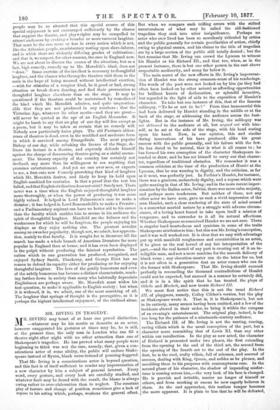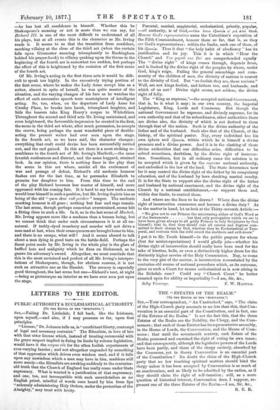MR. IRVING IN TRAGEDY.
MR. IRVING may boast of at least one proud distinction, —whatever may be his merits or demerits as an actor, however exaggerated his gestures at times may be, he is still, at the present time, the only man in London who can fill a theatre night after night with no other attraction than one of Shakespeare's tragedies. He has proved what many people were beginning to think was not the case, namely, that, given a con- scientious actor of some ability, the public will endure Shake- speare instead of Byron, blank verse instead of punning doggerel.
That Mr. Irving is a conscientious actor is beyond question, and this fact is of itself sufficient to render any impersonation of a new character by him a subject of general interest. Every word, every gesture, and every look are carefully studied, and whatever fault may be found with the result, the blame is always owing rather to over-elaboration than to neglect. The constant play of feature and change of position sometimes give a lack of repose to his acting which, perhaps, weakens the general effect.
people may be so situated that this special source of this But when we compare such trifling errors with the stilted unnaturalness of what may be called the old-fashioned tragedian they sink into utter insignificance. Perhaps no actor who ever lived has been so mercilessly ridiculed by critics and the public generally for certain peculiarities of action, chiefly owing to physical causes, and his claims to the title of tragedian are by a large section of the public still totally denied ; but the fact remains that Mr. Irving can crowd the Lyceum to witness his Hamlet or his Richard Ill., and that too, when, as in the present instance, there is but one other person in the cast above respectable mediocrity, and many far below it.
The main secret of the new effects in Mr. Irving's impersona- tion of Hamlet was the strong common-sense of his renderings.
The words of the poet were not looked on by him (as they had often been looked on by other actors) as affording opportunities for brilliant bursts of declamation, or splendid invective, but regarded in the light of aids to the exposition of Hamlet's character. To take but one instance of this, that of the famous soliloquy, "To be or not to be ? " From time immemorial this had been delivered by Hamlet standing in the middle or at the back of the stage, or addressing the audience across the foot- lights. But in the instance of Mr. Irving, the soliloquy was
not delivered to the audience at all, but argued out with him-
self, as he sat at the side of the stage, with his head resting upon his hand. Now, in our opinion, this and similar daring innovations of his have produced alike his great success with the public generally, and his failure with the few. He has dared to be natural, that is what it all comes to ; he has formed his own conception of the character Shakepeare in- tended to draw, and he has set himself to carry out that charac- ter, regardless of traditional obstacles. We remember it was a
common criticism at the time of the production of Hamlet at the Lyceum, that he was wanting in dignity, and the criticism, as far as it went, was perfectly just. In Fechter's Hamlet, for instance,
there was a gracious, melancholy dignity, and a repose which were quite wanting in that of Mr. Irving; and in the more recent imper- sonation by the Italian actor, Salvini, there was more calm majesty, and perhaps more tenderness. But neither of these, nor any other actor we have seen, gave us such a vivid impression of the man Hamlet, such a clear rendering of the state of mind caused in a somewhat morbid nature by a struggle with adverse circum- stance, of a loving heart forced to take upon itself a mission of vengeance, and to surrender to it all its natural affections.
Whether Shakespeare so conceived Hamlet we are not sure. There is singular hard-heartedness and cynicism in some of the traits Shakespeare attributes to him ; but this was Mr. Irving's conception, and it was well worked out. It is clear that we may with advantage put up with manifold roughnesses and eccentricities in an actor, if he gives us the real kernel of any fair interpretation of the part,—and the real kernel of any part is creating out of it an in- telligible man, and not a mere machine for the smooth delivery of blank verse ; any elocution-master can do the latter for us, but it is not often in a generation that an actor comes who can do the former with Shakespeare. That Mr. Irving should succeed
perfectly in reconciling the thousand contradictions of Hamlet could not be expected, but succeed in a manner he certainly did, and it is in a like spirit that he has treated the plays of Othello and Macbeth, and now treats Richard 111.
We must first notice that this is not the usual Richard III. of playgoers, namely, Colley Cibber's version, but the play
as Shakespeare wrote it. That is, it is Shakespeare's, but not in its entirety, many scenes having been omitted, and a few of the incidents altered in their order, to bring it within the compass of an evening's entertainment. The original play, indeed, is far too long for the patience of a nineteenth-century audience.
The Richard III. of Mr. Irving is not the ranting, rowing, raving villain which is the usual conception of the part, but a character more resembling that of Louis XI. than any other within our recollection. In the play as now acted, the character of Richard is presented under two phases, the first extending from the opening to the end of the third act, the second from the opening of the fourth act to the end of the play. In the first, he is the cool, crafty villain, full of schemes, and assured of success, dealing with King, Queen, and nobles as he pleases, and moulding them to his purposes with contemptuous ease. In the second phase of his character, the shadow of impending misfor- tune is coming across him,—the very look of his face is changed.
He is peevish and irritable, master no longer of himself or others, and from mocking at omens he now eagerly believes in them. As the end approaches, this restless temper becomes the more apparent. It is plain to him that he will be defeated,
—he has lost all confidence in himself. Whether this be Shakespeare's meaning or not is more than we can say, for Richard Lii. is one of the most difficult to understand of all Isis plays, but at all events this is the character as Mr. Irving reads it. It seems to us that the transition from confident, mocking villainy at the close of the third act (when the curtain falls upon Gloucester sneering triumphantly to Buckingham behind his prayer-book) to villainy quaking upon the throne in the beginning of the fourth act is somewhat too sudden, but perhaps the effect of this is heightened by the omission of the first scene of the fourth act.
Of Mr. Irving's acting in the first three acts it would be diffi- cult to speak too highly. In the excessively trying portion of the first scene, where he makes the Lady Anne accept him as a suitor, almost in spite of herself, he was quite master of the situation, and the varying changes of his face as he watches the effect of each successive speech were masterpieces of intelligent acting. So, too, when, on the departure of Lady Anne for Crosby Place, he breaks into harsh, triumphant laughter, and bids the bearers take King Henry's corpse to Whitefriars. Throughout the second and third acts Mr. Irving maintained, and even heightened, the favourable impression he created in the first, the scene in the third act where, after much persuasion, he accepts the crown, being perhaps the most wonderful piece of double- acting the present writer had ever seen upon the stage. In the fourth act, as we have said, the character changes ; -everything that craft could devise has been successfully carried out, and the end gained. In this act there is a most striking re- semblance to the fourth act of Mr. Irving's Macbeth,—the same feverish restlessness and distrust, and the same haggard, strained look. In our opinion, there is nothing finer in the play than the scene in this act where, amidst all the excitement of war and presage of defeat, Richard's old sardonic humour flashes out for the last time, as be persuades Elizabeth to promise her daughter to him. From this time to the end of the play Richard becomes less master of himself, and more oppressed with his coming fate. It is hard to say how such a man would bear himself in such a position, but Mr. Irving depicts him as being of the old "quern deus vult perdere" temper. The sardonic mocking humour is all gone ; nothing but fear and rage remain. The last scene, though perhaps somewhat overstrained, seems bfit a fitting close to such a life. In it, as in the last scene of Macbeth, Mr. Irving appears more like a madman than a human being, but we cannot think that under such circumstances it is at all un- natural. If trebly-dyed treachery and murder will not drive a man mad at last, when their consequences are brought home to him, and there is no escape, what will ? And it seems absurd to talk about a man dying in good taste on the battle-field. Perhaps the finest point made by Mr. Irving in the whole play is the glare of baffled hate and malignity which he fixes on Richmond, as he gnaws his adversary's sword. Altogether, we must conclude that this is the most sustained and perfect of all Mr. Irving's interpre- tations of Shakespeare, though, for obvious reasons, it is not such an attractive one as the Hamlet. The scenery is especially good throughout, the last scene but one—Richard's tent, at night —being as picturesque an interior as we have ever seen put upon the stage.



































 Previous page
Previous page